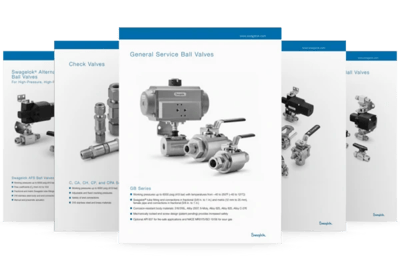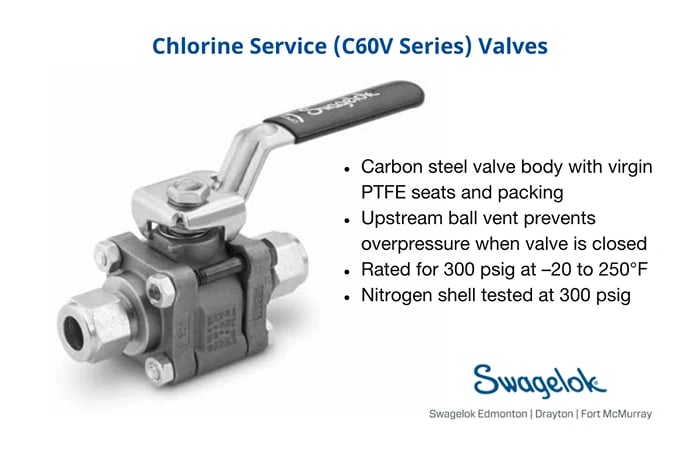Share this
Swagelok Valve for Chlorine Service: Ball Vent and Carbon Steel Body
by James Dickie on Tue, Apr 09, 2024 @ 07:04 AM
Swagelok's C60V Series valves, designed for chlorine applications, combine carbon steel bodies with virgin PTFE seats for optimal safety and adherence to Chlorine Institute guidelines. These valves feature a ball vent to prevent overpressurization, undergo rigorous testing for reliability, and are meticulously cleaned and packaged for immediate chlorine service use.
Swagelok's Chlorine Series (C60V Series) valves are designed with specific materials to ensure safety and reliability when handling chlorine applications. The valve body is made of carbon steel, paired with virgin PTFE seats and packing.
This construction adheres to the stringent guidelines in Chlorine Institute Pamphlet 6, which covers Piping Systems for Dry Chlorine, ensuring compatibility and safety in chlorine service environments.
These valves also feature an upstream ball vent that prevents overpressurization in the ball and body when the valve is closed, further enhancing operational safety and reliability. C60V valves offer pressure-temperature ratings of 300 psig at temperatures ranging from –20 to 250°F (20.6 bar at –28 to 121°C), good for a range of chlorine service applications.
Readiness for immediate use
For cleanliness and safety, the valve bodies and flanges undergo a two-step cleaning process:
- First, with mineral spirits
- Second, with aqueous cleaning solution containing a surfactant
(All other wetted components are cleaned according to Swagelok's Special Cleaning and Packaging SC-11 standards.)
Capped, sealed, and tagged
To ensure their integrity and readiness for chlorine service, C60V series ball valves are individually capped and sealed in desiccant packaging. And each valve is tagged for chlorine service, emphasizing its specialized use.
Moreover, every valve within the chlorine series undergoes rigorous factory testing, including both seat and shell tests with nitrogen at 300 psig (20.6 bar). These tests are stringent, with seats having a maximum allowable leak rate of 0.04 std cm^3/min, ensuring the valves meet high standards of quality and reliability for handling chlorine.
Special alloys
Swagelok carries an array of special alloys to meet our customer's requirements. Two important pieces to note:
- Alloy 600, a nickel-chromium-iron alloy. This strong alloy is highly resistant to chloride-ion induced stress corrosion cracking.
- Titanium alloys. They have excellent resistance to corrosion in a wide variety of environments including seawater, salt brines, inorganic salts, bleaches, wet chlorine, alkaline solutions, oxidizing acids and organic acids.
There is often an elevated chlorine level in boiler water, for example. Chlorine and stainless steels don’t mix well and it is common to find stress corrosion cracking in applications that have high chloride levels and stainless steel fittings and tubing. Again, there are a number of materials that we offer that can provide the necessary corrosion resistance in this type of application.
Chlorine applications support
Swagelok Edmonton offers certified fluid system experts who help customers take action on fluid system challenges. Talk with our team about instrumentation, leaks, seal flush plans, and more. Combine, adapt, and/or tailor services so you get the advice you need. Choose onsite or virtual collaboration.
Download 60 Series Ball Valve catalogues and more

Get literature on 60 Series, One-Piece Instrumentation, and several other valve lines.
Getting help with valves
Requesting evaluation and advice from a Swagelok Edmonton Field Advisor is a great way to start any project involving fluid systems. We listen to understand your priorities, gather information on your systems and routines, conduct onsite inspections as appropriate, and offer detailed recommendations. Our goal is to help identify opportunities to increase reliability while lowering your operating costs and minimizing risks. Both onsite and remote support are available. More →
Related articles
- High-Pressure Corrosive Environment? High-Temperature Vacuum Environment? Meet Our FX Series Metal Hose (Video, Cutaway)
- Choosing Swagelok Tubing & Fitting Alloys? Engineered Combinations Resist Corrosion & Minimize Cost
- Replacing Industrial Valves? Use This 7-Step Method to Verify Selection
- FAQ: Which is the Correct 60 Series Ball Valve?
- Bend Your Emissions Curve with Swagelok Low-E Valves (New Video, Free PDF)
Share this
- Local Services (103)
- Field Advisors (101)
- Training & Events (86)
- Fittings (81)
- Valves (66)
- Resources (62)
- Tubing (62)
- Sampling Systems (60)
- Design & Assembly (57)
- Resources - Downloads (40)
- Hose & Flexible Tubing (39)
- Frequently Asked Questions (37)
- Regulators (34)
- Cost Savings (33)
- Oil & Gas (33)
- Videos (33)
- Steam Systems (29)
- Mechanical Seal Support (17)
- Measurement Devices (15)
- Gas Distribution Systems (9)
- Rentals (6)
- winterization (6)
- Safety (5)
- Covid (3)
- Hydrogen & Clean Energy (3)
- About Us (1)
- April 2024 (3)
- March 2024 (2)
- January 2024 (3)
- December 2023 (2)
- November 2023 (3)
- October 2023 (2)
- September 2023 (3)
- August 2023 (3)
- July 2023 (3)
- June 2023 (2)
- May 2023 (4)
- April 2023 (2)
- March 2023 (2)
- February 2023 (3)
- January 2023 (2)
- December 2022 (1)
- November 2022 (1)
- October 2022 (2)
- September 2022 (5)
- August 2022 (3)
- July 2022 (6)
- June 2022 (4)
- May 2022 (3)
- April 2022 (1)
- March 2022 (2)
- February 2022 (3)
- January 2022 (4)
- December 2021 (4)
- November 2021 (6)
- October 2021 (3)
- September 2021 (5)
- August 2021 (9)
- July 2021 (5)
- June 2021 (7)
- May 2021 (7)
- April 2021 (4)
- March 2021 (3)
- February 2021 (3)
- January 2021 (2)
- December 2020 (3)
- November 2020 (3)
- October 2020 (2)
- September 2020 (3)
- August 2020 (3)
- July 2020 (3)
- June 2020 (3)
- May 2020 (3)
- April 2020 (2)
- March 2020 (3)
- February 2020 (3)
- January 2020 (3)
- December 2019 (2)
- November 2019 (3)
- October 2019 (3)
- September 2019 (2)
- August 2019 (3)
- July 2019 (2)
- June 2019 (2)
- May 2019 (3)
- April 2019 (3)
- March 2019 (3)
- February 2019 (2)
- January 2019 (3)
- December 2018 (2)
- November 2018 (2)
- October 2018 (4)
- September 2018 (2)
- August 2018 (3)
- July 2018 (3)
- June 2018 (2)
- May 2018 (4)
- April 2018 (3)
- March 2018 (3)
- February 2018 (3)
- January 2018 (4)
- December 2017 (1)
- November 2017 (4)
- October 2017 (4)
- September 2017 (4)
- August 2017 (5)
- July 2017 (3)
- June 2017 (4)
- May 2017 (4)
- April 2017 (3)
- March 2017 (5)
- February 2017 (4)
- January 2017 (4)
- December 2016 (3)
- November 2016 (3)
- October 2016 (4)
- September 2016 (3)
- August 2016 (4)
- July 2016 (2)
- June 2016 (2)
- May 2016 (2)
- April 2016 (4)
- March 2016 (2)
- February 2016 (3)
- January 2016 (4)
- December 2015 (4)
- November 2015 (4)
- October 2015 (5)
- September 2015 (2)
- August 2015 (4)
- July 2015 (5)
- June 2015 (2)
- May 2015 (3)
- April 2015 (5)
- March 2015 (3)
- February 2015 (4)
- January 2015 (3)
- December 2014 (5)
- November 2014 (4)
- October 2014 (4)
- September 2014 (4)
- August 2014 (4)
- July 2014 (5)
- June 2014 (4)
- May 2014 (4)
- April 2014 (5)
- March 2014 (4)
- February 2014 (4)
- January 2014 (4)
- December 2013 (3)
- November 2013 (4)
- October 2013 (5)
- September 2013 (4)
- August 2013 (5)
- July 2013 (4)
- June 2013 (3)
- May 2013 (4)
- April 2013 (5)
- March 2013 (2)
- February 2013 (3)
- January 2013 (5)
- December 2012 (3)
- November 2012 (3)
- October 2012 (5)
- September 2012 (3)
- August 2012 (4)
- July 2012 (4)
- June 2012 (1)






